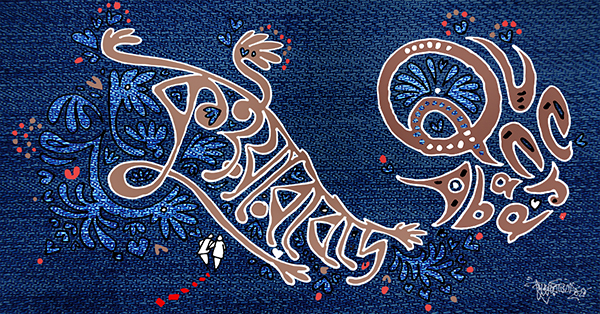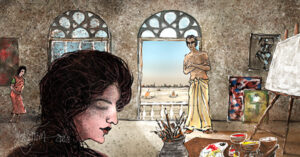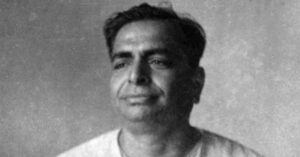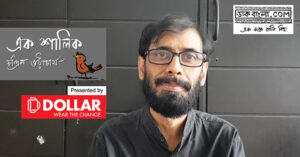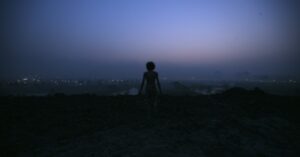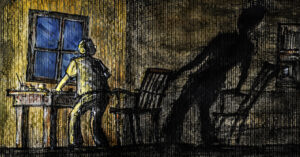I’ve been out since I was 11 years old,” says Anahita Sarabhai. Growing up in Ahmedabad – a city with a largely conservative society – Anahita’s privileged background and upbringing gave her access to much, but also cut her off from many experiences and realities. Growing up queer, she didn’t know (there was) anyone else like her in Ahmedabad. Leaving the city for higher education in Sarah Lawrence College on the outskirts of New York City – an institution that boasted a majority queer population at that time – changed all that. She discovered what it was like to have, belong to, and be surrounded by a community. She saw alternatives, and recognised what she missed in Ahmedabad. Coming home to her city actually felt like leaving a family behind in America. This lack of a community that gave her the space to be her true self and connect with others like her became a catalyst for setting up QueerAbad.
Sitting across a café table with Rohit Gupta and Anuckriti Garg, the former gently refutes my suggestion that QueerAbad provided a voice and a space for a pre-existing, but perhaps secret, community in Ahmedabad. QueerAbad is actually a response to what wasn’t there at all in the city – a space to meet other queer people, talk, and share ideas. Other than dating apps, there wasn’t really much of a public queer space in the city. A community built around dating apps is very different from one built around ideas and imagination. It’s not a community tied together by some desires, but a community that chooses to come together around beliefs, values and needs. QueerAbad gives the queer community both a voice and a space, but also offers anybody (regardless of their sexual preferences or gender identifiers) a lens to see the world differently, to understand the world through other people’s eyes. As Anahita and Shamini (co-founders of QueerAbad) say in the first issue of the zine Tilt, it gives “access to a queer world and way of life with all its tedha-ness”.
Back in India, Anahita heard some whispers about some allied events. Through these she was very secretly invited to join an existing group. She was surprised to find herself as one of the only female-identifying people there. The small group did potlucks, but never engaged with the world outside of themselves. They seemed comfortable living in the shadows. Their world, too, was very small and cliquey. It was an example of a certain shared mentality that is not only problematic, but also violent – a huge amount of trans-phobia began to erupt, for example. It seemed to reflect a conservative mind-set wanting to be progressive. But this was apparently all that was available – a group that was inaccessible for basically 99% of the queer population in the state. It felt like being pushed back into the closet in many ways.
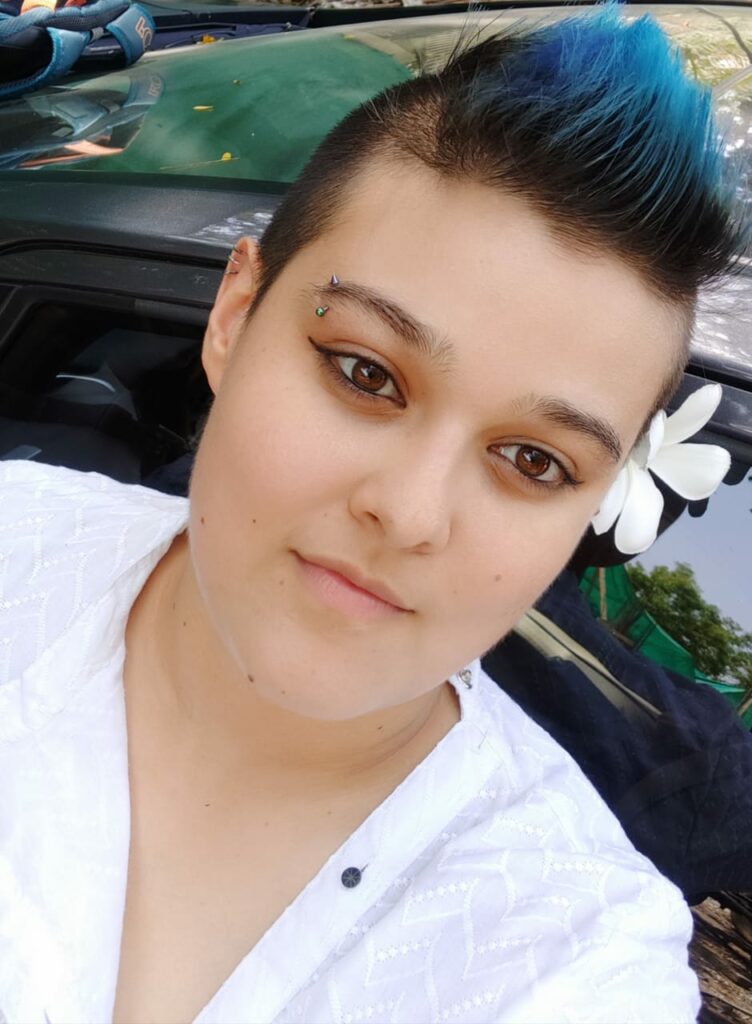
Photograph courtesy Anahita Sarabhai
“In the context of queerness, coming to a space can be scary,” says Rohit. There are so many barriers – political, economic, social, and psychological – that determine who has access, who feels welcome. And QueerAbad’s job is to dismantle those barriers. The events are curated, but never the audiences – even though having them completely open can make things uncomfortable. However, it’s been interesting to see the range of people who come to the events, and who they come with. Anuckriti attended her first event with her mother, for example.
Is it safe, though, to have this openness in a climate that is closely controlled and relatively conservative? Is the online space safer? The digital space does allow for some anonymity, and perhaps deals with the question of access in one way (though cutting off many others). But both Rohit and Anuckriti underline that it is actually the online space that has more surveillance, and self-censorship manifests itself far more readily here.
Is it safe, though, to have this openness in a climate that is closely controlled and relatively conservative? Is the online space safer? The digital space does allow for some anonymity, and perhaps deals with the question of access in one way (though cutting off many others). But both Rohit and Anuckriti underline that it is actually the online space that has more surveillance, and self-censorship manifests itself far more readily here. Additionally, conversing in multiple languages, translating for each other informally, reading cues from body language are organic parts of the communication and comprehension process – that’s how we function in this country. Achieving that sense of informal connection and community in an online space is extremely difficult.
Stepping out of this small LGBT+ group with a few others, Anahita began QueerAbad, alongside her then partner Shamini Kothari, and with the support of those who had left with them. She realised that the name had actually pre-existed in her sub-consciousness – it just fit! Quoting again from Tilt: ‘Apart from the obvious city association, it was the fact that “abad” literally means “cultivated place”, which in some senses is exactly what the Queer scene needed and would be working towards’.
The community needed to be reborn from the ground up. Ahmedabad, in a sense, allowed for that since nothing much had been done before. The community needed to start together without hierarchies and categorisations, flesh out what it required, and identify core values for itself – values that would be shared with allies. There had to be a permanent state of allyship, so to speak, to create spaces for various voices to be heard and interconnected. There could not be one “membership card of queerness”. QueerAbad functions from a very intersectional feminist perspective, even though many people don’t quite understand that – or the necessity for that – fully yet. The need for intersectionality to understand the inter-relatedness of issues facing all kinds of marginalised communities in India and across the world is not rocket science. But a conservative conditioning is so strong, that it may as well be. Just because one identifies as queer does not mean one is automatically completely ‘liberal’ in thought. The queer community – like any other – is not so conveniently homogenous.
QueerAbad functions from a very intersectional feminist perspective, even though many people don’t quite understand that – or the necessity for that – fully yet. The need for intersectionality to understand the inter-relatedness of issues facing all kinds of marginalised communities in India and across the world is not rocket science.
In the copy of Tilt that Anuckriti hands me is a little leaflet called ‘Queer ABCs’. It’s a list of 25 terms with brief descriptions. Apart from the first three (sex, gender, sexuality), all the rest are specific gender and/or sexuality identities. To me, some terms are unfamiliar, many are clarified. Rohit surprises me by asking, “What are the personal pronouns you go by?” It’s a question they work into QueerAbad programmes as a way to get to know everyone. Usually, they include it in their own introductions, and let others take a cue from there. Rohit goes by they/them or he/him, while Anuckriti goes with she/her. I have always used he/him without giving it any thought. But it’s not a question I have ever been asked. In that instant, the personal became the political just because I had been asked to consider how I would define myself through un/gendered personal pronouns.
QueerAbad has, in Rohit’s view, evolved from a position of relative political neutrality to being overtly political. Having a voice and presence is one thing: using it to speak against oppressive, exploitative or violent social, cultural and political issues across the board is quite another. The queer community as a whole may wish to be seen, heard, and counted – but those may not be the values that individuals within the community apply to everyone else. Building solidarity must make space for discomfort in order to grow and strengthen itself. So how does one balance this dual challenge of building the community from within, and pushing towards a stated objective of a plural queer-ally safe space and community?
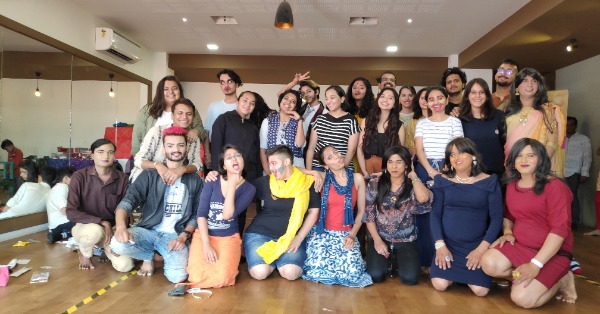
Photograph courtesy Anahita Sarabhai
QueerAbad began as an online space. When the first offline event – poetry readings from queer literature – was organised in 2016, there was no telling how many people would show up. It has steadily grown from there, with a host of regular signature programmes as well as events such as annual Pride Marches and melas, concerts, and fundraisers.
‘Ask What You Will’ is a series that brings together the community to build resilience and self-dependence by drawing on the personal experiences of individuals. Rather than invite so-called experts to advise, the belief is that the resources within the community that live in Ahmedabad / Gujarat / India provide the best examples and possibilities of ways forward. The event invites attendees to anonymously contribute questions or conversation points anonymously on chits of paper. These are then discussed together, with members of the community offering experiences from their own lives to help others navigate the issues they may be facing. It gives the community greater value within itself, asks everyone to listen empathetically, and share from a space of personal solidarity. Issues have ranged from the personal to the political to the abstract. Family, religion, forced marriage, and loneliness are issues that often show up.
At some point QueerAbad realised that the “safe space” that they provided could only take the community so far. There would be times and contexts that would put people in positions that could not be as safe as a meeting happening within four walls. So ‘RakhadPatti’ – a Gujarati term which means to roam around carelessly – came about as a means to occupy public spaces together in a way that the community could all depend on and draw courage from each other’s presence. It was important to actively be seen in public spaces and identified as queer, to “normalise” the existence of the community.
‘In Confidence’ is a collaboration with a mental health organisation. A clinical psychologist and a QueerAbad team member together train a group of people to be good (or better) listeners, to give another person a space to speak. Confidentiality is assured, and the entire programme is based on the mutual trust within the larger community. This comes out of Anahita’s belief that creating better listeners who listen more actively and empathetically will create room for people to share more honestly. Rather than leave this just to the therapists, there can then be individuals from within the community who provide support for people in every situation. This was imagined as a quarterly event, but has only happened twice before the lockdown.
‘In Confidence’ is a collaboration with a mental health organisation. A clinical psychologist and a QueerAbad team member together train a group of people to be good (or better) listeners, to give another person a space to speak. Confidentiality is assured, and the entire programme is based on the mutual trust within the larger community.
Through all these programmes, QueerAbad became a space that a range of people including those outside of the queer community could choose to access. There was a sense of satisfaction and even security to know that the space existed. Rohit calls it the Garden Effect: it feels good to have, whether you go into it or not.
With the lockdown, though, these regular programmes and the opportunity to meet came to a halt. Being queer, and having no place to go for support and community, not being able to step out from what may not be a safe or supportive environment, hit hard. QueerAbad discovered a new role during this time as requests for help started pouring in, and they found themselves involved in crisis interventions. Helping people to get out of their abusive homes, to get away to other cities away from their families; shifting trans-youth and partners to safe locations, finding them homes and secure jobs; offering mental health support to people who had no access because of the circumstances they lived in … the range of crises demonstrated the degree of inequalities and divisions within society in India. Of course, this lockdown ‘revelation’ is not limited to the queer community at all – the fractures have broken through, raw and bleeding, everywhere. Anahita says that it was heart-warming to see how the community stepped up to help – it didn’t matter who you were. Through this happenstance and collective experience of the pandemic, people have realised that all of us are susceptible to some of the same things. But, she underlines, it’s also unfortunate that it takes a crisis of pandemic proportions that affects you viscerally to understand that we are all in this together and our lives are intertwined no matter what.
“Today, perhaps the hardest thing is to continue the work you do and remain hopeful. Lots of people are doing flashy things, bringing in big names, but we are trying to meet the needs of the community every day however we can. What really hits home is something you can return to, trust and rely on. Our everyday life doesn’t give our queer selves that.”
Anahita’s statement puts into perspective all that QueerAbad has now chosen to do in a COVID destabilised world. Whether the pandemic has ignited some lasting humanity in humans remains to be seen, but that our concerns are interrelated is now indisputable. It’s a good time, therefore, to push the concept of intersectionality, and understand that categories of ‘me’ and ‘you’ only work against us. During the lockdown, QueerAbad began an online series of interactions – ‘Queerantine Fridays’. Through this platform, they have focussed on bringing in queer and ally voices to talk about how some issue is “also your problem”. Understanding this would make a huge difference to how we live our lives.
Anahita’s own interest in education, and changing and creating educational resources and content has led to QYSSA – Queer Youth Solidarity Support and Affirmation. This came from having personal experiences with children of people she has known all her life, and encountering the fear they have of their families and the violence they endure at home. QYSSA is a bimonthly event for anyone under the age of 25. Facilitated by Anahita, it creates a space for young people to see and hear each other, figure things out together and be reminded that we all do exist. In the three sessions they’ve had so far, there have been participants from seven different cities – and two people from outside India. Anahita states unequivocally – “we have to be able exist beyond these bullshit borders”.
The biggest change over the last five years has been learning how to listen to each other and reflect on who and what the community is and can be, identifying and working through internal negativities, phobias, shame and self-hatred. It’s been a journey to figure the community out from the inside. Anahita: “If we are so horrendous to ourselves and cannot even come together within the community, we cannot expect other people to do the work and get past their biases.”
QueerAbad seems to be part of a series of ventures in Ahmedabad in the last few years – part of an attempt by young Ahmedabadis who have returned to the city (or may never have left at all) and taken up the responsibility of creating interesting spaces that respond to the yawning gaps in the city’s socio-cultural scape. Subversion happens in the nooks and crannies – especially in places where there is such deep oppression. It’s the “little plant that grows out of the cement”. These ventures fill in unexpected and beautiful colour to what has sadly become a black and white city in the ways it (officially) presents itself.
However, Anahita and her team are becoming more and more nervous about the work they are now doing. Speaking up, taking political stands on issues and for communities that are not obviously queer puts a target on your back from both outside and inside the community. But, quoting from Tilt again: Anahita and Shamini “had the voice, the dreams, the vision and most of all the privilege” to create something like this. And, Anahita shrugs, “for many of us, there isn’t a choice”.
This statement may come across as sombre and sobering. But perhaps what makes it more alarming (and also more hopeful) at this point of time in India, is the growing number of the small percentage of privileged Indians who can identify with and must stand by this sentiment:
For us, there isn’t a choice.
